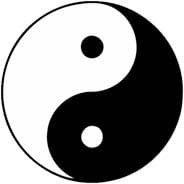So it was that a storm of outrage followed the publication of Richard Dawkin's book The Selfish Gene, whose title seems like a taunt to both the Bible thumpers and the humanists. He was simply relating the findings of modern biologists who are telling us that our behavior is largely governed by genes who only want to replicate themselves.
So don't blame yourself if most of your thoughts are about you. Even if your genes are selfish, it's not your fault. Blame it on your genes. It's evolution's fault. Nature wants it this way. And for good reason: Life needed to be deeply programmed with the determination to continue or it might have died out at the first sign of hardship. The anaerobic bacteria who began to choke on their own waste may have just given up rather than morph into beings who lived on oxygen. Life had to be pumped up with the desire to live, down to the most basic molecules, or else living beings might never have gone to the trouble to become multi-celled, let alone to have figured out higher mathematics.
So rather than cast the survival imperative as evil or brutish, maybe we should celebrate it. If we could only see living beings as a single entity, or at least part of the same experiment, then the selfish gene can be seen as noble, glorious, even worthy of reverence. It is no longer regarded as selfish for its own sake, but for the sake of life itself. We should all be singing the praises of the selfish gene and toasting its insistence on living. "L'chayem."
Your Mama Is a Germ
Why should we think that the universe was made for us? A better case can be made that the world was created for the lowly bacteria. Single-celled bacteria are the most successful of all life forms, having lasted for three and a half billion years, surviving all the great species extinctions and still thriving, uncountable trillions of them, teeming everywhere, covering everything. In fact, billions of bacterium are living their individual little lives inside of your mouth right now. Maybe they even have houses in there, churches and roads -- a whole civilization between your cheeks! There is some speculation that bacteria invented humans as moving feedlots. Inside of us they get room and board as well as a tour of the neighborhood.

But, you ask, could the bacteria be created in God's image? Why not? I can imagine God in the shape of a single-celled being: like a little round ying-yang symbol. God as a drop of protoplasm pulsing with life, with a permeable see-through membrane. God, the Great Germinator.
Whether or not they are the crown of creation, bacteria are incredibly successful, and one reason is because they reproduce by just dividing -- they don't have to take each other out to dinner first. The little bacterium just pulls its DNA evenly across its body, and then splits itself into two.
Maybe to a bacterium that splitting-in-two behavior feels good like sex, and that's why bacteria divide so often. Is it something akin to masturbation?
Too bad we humans can't go back to dividing as a means of reproduction. Of course, it would be traumatic to think of losing half of yourself, but on the other hand, dividing would double your chances for a happy life. And then quadruple them, etc.
Another reason to believe that life was created for bacteria is the fact that they aren't programmed to grow old and die. Bacteria can be killed but they don't die naturally, which brings us to a major turning point in the life of the planet -- death.
The bacteria themselves were doing quite fine for well over a billion and a half years, having a leisurely time floating around in the Archean seas. Then one fateful day (epoch), at some auspicious moment (era), the bacteria began to merge with each other, and started to combine their little packets of DNA.
Blame it on love, or at least, attraction. Okay, it was a marriage of convenience. The merging of two cells usually took place when it was useful for the survival of both -- "You've got a little flagella to move yourself around, and I'm growing some eyes, so let's get together and we'll be sittin' on top of the food chain!"
After some time, the cells that joined together became a whole new life form, a multi-celled being, who was now carrying information and instructions from two different DNA sources. Since two packets of Divine Natural Abundance are more inventive than one, the new microbes began incorporating other useful creatures into themselves, and eventually had to start putting their overflowing library of DNA into a completely separate body. There was no more room in the cell.
So, "Ta-da!" Sex was invented as a way of putting great amounts of DNA together into a separate new organism, leaving lots of room for variation and complexity.




